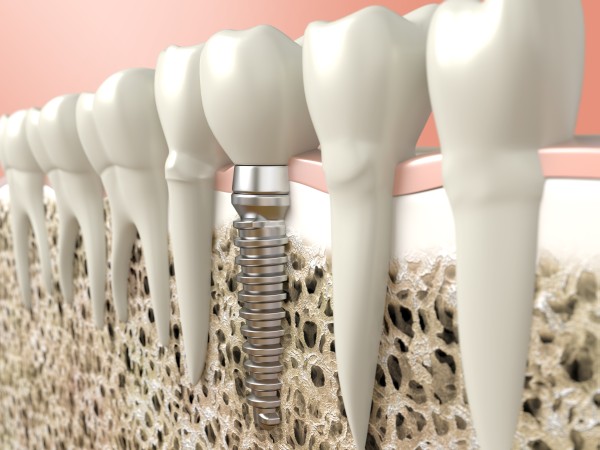How Long do Dental Implants Last?

A dental implant is an excellent option for long-term tooth replacement, but a common question is how long do dental implants last?
Factors that alter how long dental implants are viable depend on the patient's lifestyle and dental hygiene. The technology of dental implants has become so progressive over the years that implant failures due to rejection or functionality issues have become problems of the past. Preexisting medical conditions, diseases and implant misappropriation are more likely factors to create an implant to fail.
Components of a dental implant
To grasp and understand the question of life expectancy of an implant, we need to lay out the three fundamental mechanisms of a dental implant:
- Implant: The implant is a titanium post that is attached to the jawbone and acts as a root for the crown.
- Abutment: The abutment fastens to the implant and holds the crown in place.
- Crown: The crown is a ceramic tooth that attaches to the abutment and provides the look of a natural tooth.
Overall, the exposed abutment and the crown are more vulnerable to damage than the implant itself.
How long do dental implants last?
When maintained with proper brushing and flossing, the implant itself can last a lifetime, assuming the patient gets regular dental check-ups twice a year. A crown, nevertheless, is rated to last around 10 to 15 years before normal wear can cause the tooth to need replacement. That said, excellent dental hygiene could extend the life beyond15 years.
Mouth location is also part of the criteria in the likely longevity of a dental implant. Implants in the back of the mouth receive more strain from all the chewing. This can cause the implant to fail more sooner than implants near the front of the mouth.
Dental implants vs. added tooth replacement options
A dental implant is a permanent answer for missing teeth and has become the standard tooth-replacement choice. Unlike dentures, a dental implant provides enough support to act as a natural tooth and can withstand biting or chewing without slipping.
What factors can cause an implant to fail?
Dental implants deliver long-term, indefinite sustainability when cared for correctly. Many factors can cause an implant to weaken prematurely. People who have diabetes or a preexisting condition, such as cancer, have a higher risk of dental implant failure.
Like natural teeth, you must take care of dental implants through regular brushing and flossing. In worse cases, poor home-care can lead to gum disease, which is another culprit that can obstruct the success of a dental implant.
Feel free to contact a local cosmetic dentist to learn more about dental implants and proper care methods.
Thinking about dental implants?
If you are contemplating dental implants, it is wise to see the best implant dentist possible. An implant specialist uses the latest techniques and technologies to achieve satisfying results. Once the implant is positioned, the patient can have a beautiful restoration crafted by a cosmetic dentist.
Contact a cosmetic dentist today to schedule a dental implant consultation.
Request an appointment here: http://www.hendersonfamilydentistry.com or call Henderson Family Dentistry at (903) 657-3139 for an appointment in our Henderson office.
Related Posts
Dental implants are the preferred tooth replacement for many patients and dentists. Though they have many advantages, one must be a good candidate to enjoy their benefits. Here is a closer look at dental implants and what makes someone a good candidate for them.A dental implant is a small screwlike metal post that a dentist…
You can do research on dental implants on your own, but getting the facts from your dentist can give you more inside information. These restorations can replace dental roots and crowns. Each one can improve your smile and strengthen your bite. The following are facts that you can get from your general dentist when it…
Dental implants are small titanium posts surgically implanted in the jawbone and act as artificial tooth roots. Dentists can use these posts to support replacement teeth such as crowns, dentures, or bridges, restoring the appearance and function of your smile. However, not all dental implants are created equal. There are several types of dental implants,…
Dental implants are available to provide permanent restoration to missing teeth. Though a favorite among dental professionals and patients, there are a few things to consider before choosing these smile restoratives.Patients will need an adequate amount of underlying jaw for the dental implant process. Patients with insufficient jawbone density may be eligible for bone grafts,…
